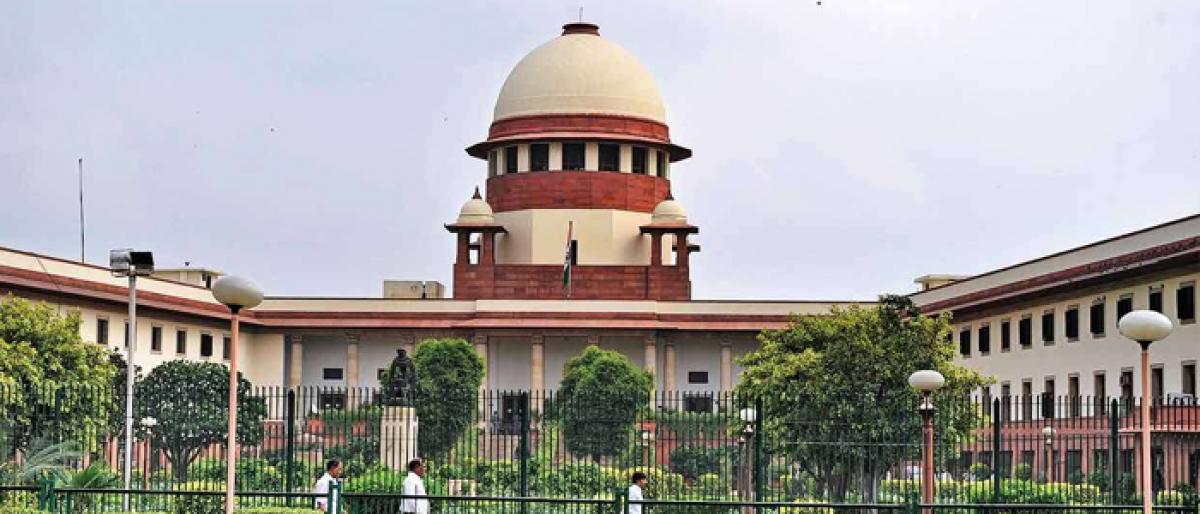Live
- Zero-Latency VR: The Untapped Goldmine for Esports and Competitive Gaming
- Collector Inspects EVM Godown in Nagarkurnool
- Devotees' Tragic Demise in Tirumala Stampede: Chakravarthy Acharyulu Expresses Deep Condolences
- Disability can be identified and prevented in the early stages -DMHO Dr. K.V. Swarajya Lakshmi
- Ram Charan's 'Game Changer' Set for Big Box Office Debut
- Scientists Provide Training to Farmers on Integrated Farming
- SP Gaikwad Launches Feedback QR Code Poster for Police Services Opinion
- Helping Hands Charitable Trust Distributes Study Material to 3,000 Students in Gattu Mandal
- Samajwadi Party Strengthens Leadership in Telangana and Andhra Pradesh
- Poco X7 5G and Poco X7 Pro 5G Launched in India: Price, Specifications, and Features
Just In

The Supreme Court on Tuesday ordered that states cannot appoint acting DGPs. It also ordered that states have to approach the UPSC mandatorily, three months before the retirement of the incumbent DGP for the selection of new DGP.
New Delhi: The Supreme Court on Tuesday ordered that states cannot appoint acting DGPs. It also ordered that states have to approach the UPSC mandatorily, three months before the retirement of the incumbent DGP for the selection of new DGP.
The slew of directions came to be passed by a bench of Chief Justice Dipak Misra and Justices AM Khanwilkar and DY Chandrachud in the petitions relating to police reforms.
Putting an end to political favouritism in appointments of police chiefs, the Supreme Court has ordered that all states and Union Territories shall not to appoint a “politically convenient” police officer to the position of Director General of Police (DGP).
“The UPSC will shortlist names of state DGPs and prepare a panel of three names and the state will have to choose one of the three names in the panel. There will not be any appointments of acting DGPs. Once appointed, a DGP will get two-year tenure irrespective of superannuation,” the top court said.
Any rule or state law on the subject of appointment of police officers “will be kept at abeyance”, it said as the Centre pointed out that states were appointing their “favourite” police officers as DGPs.
The verdict came almost 12 years after the Supreme Court issued a series of directions on police reforms on a PIL filed by former UP DGP Prakash Singh. It had ordered setting up of a state security commission to ensure that the government does not exercise unwarranted influence on the police and recommended fixed two-year tenure for DGPs and Police Superintendents.
The bench, which also included Justice AM Khanwilkar and Justice DY Chandrachud, said endeavour should be to select an officer having reasonable period of service left for appointment as DGP. However, it said states which have made laws on police appointments were free to seek modification of its order.
Tuesday’s directions of the top court came on pleas, including that of the Centre, seeking modification of the September 2006 judgment in the Prakash Singh case. It was pointed out to the court that its order had not been implemented by states and union territories even after 12 years.
Attorney General KK Venugopal told the bench only five states—Tamil Nadu, Karnataka, Andhra Pradesh, Telangana and Rajasthan—had implemented the court’s 2006 order. He said some state governments appointed their “favourite” officers as DGPs just before their retirement to give them extension while some others appointed acting DGPs.
“There is no concept of acting DGPs,” the bench commented. In its 2006 order, the top court had ordered separation of police functions of investigation and maintaining law and order; setting up of a Police Establishment Board to deal with transfers, postings, promotions and other service-related matters of officers up to the rank of DSP; Police Complaints Authority in each state to look into complaints against officers of and above the rank of SP in cases of serious misconduct.
A National Security Commission needed to be set up at the Centre to prepare a panel for selection and placement of chiefs of the Central Police Organizations with a minimum tenure of two years, it had directed.

© 2025 Hyderabad Media House Limited/The Hans India. All rights reserved. Powered by hocalwire.com







